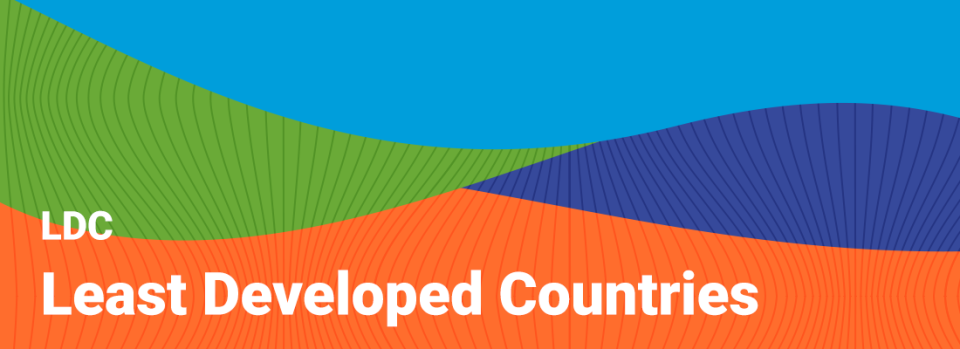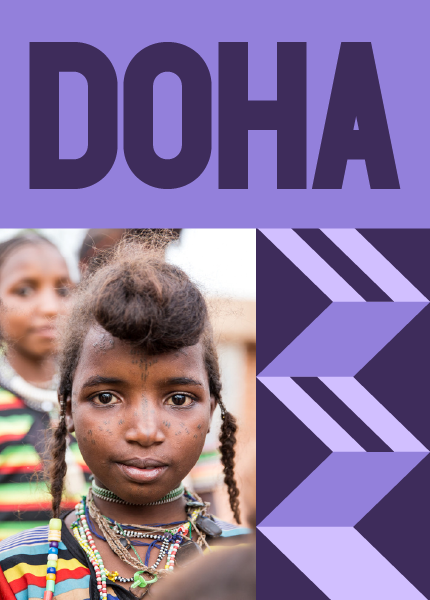Least Developed Countries

UN-OHRLLS leads coordination of the UN System and other stakeholders in supporting sustainable development of the Least Developed Countries.
Since UN-OHRLLS was established in 2001, it has been working through a dedicated Least Developed Countries Unit to mobilize and coordinate the UN System and other stakeholders towards supporting implementation, coherent follow-up and monitoring of the Programme of Action (PoA) for the Least Developed Countries (LDCs) at the country, regional and global levels.
The Doha Programme of Action for the Least Developed Countries for the Decade 2022-2031 (DPoA) is the current PoA, having been adopted at the first part of LDC5 on March 17, 2022.
The DPoA manifests a new generation of renewed and strengthened commitments between the least developed countries and their development partners, including the private sector, civil society, and governments at all levels.
The DPoA includes six key focus areas:
- Investing in people in least developed countries: eradicating poverty and building capacity to leave no one behind;
- Leveraging the power of science, technology, and innovation to fight against multidimensional vulnerabilities and to achieve the SDGs;
- Supporting structural transformation as a driver of prosperity;
- Enhancing international trade of least developed countries and regional integration;
- Addressing climate change, environmental degradation, recovering from COVID-19 pandemic and building resilience against future shocks for risk-informed sustainable development;
- Mobilizing international solidarity, reinvigorated global partnerships and innovative tools and instruments: a march towards sustainable graduation.
How does UN-OHRLLS work with the UN System and other stakeholders?
UN-OHRLLS plays a leading role in convening the UN System through the Inter-Agency Consultative Group for LDCs and collaborates with UN agencies and other partners on joint events, publications and thematic initiatives in support of LDCs’ priorities. The Office also chairs the UN Inter-Agency Task Force on Least Developed Country Graduation, which aims to step up coordinated UN support to government of graduating LDCs to ensure a smooth transition out of the LDC category.
Monitoring and reporting is critical to understanding the progress LDCs are making in achieving sustainable development. With inputs from the UN System and other stakeholders, the Office prepares the annual report of the Secretary-General on the implementation of the DPoA. The Office also produces an annual report on ‘The State of the LDCs’ which provides substantive research and latest trends on how LDCs are progressing in achieving the internationally agreed goals.
The Office also organizes events and undertakes activities related to the implementation of the Sustainable Development Goals (SDGs) and to highlight the benefits of coherence between the PoA for the LDCs and the SDGs.
Aside from LDC governments and their development partners, UN-OHRLLS also engages with civil society, media, academia, and foundations to raise awareness of and support the sustainable development aspirations of the LDCs. This work also includes supporting journalists from LDCs to build their capacity in reporting on sustainable development issues pertaining to LDCs.
How does UN-OHRLLS work directly with LDCs?
Through a network of LDCs National Focal Points, the Office engages directly with government representatives from LDCs to ensure coherence between global discussions and national development priorities. Workshops for the National Focal Points are convened annually either at UNHQ or elsewhere. At UNHQ, they typically take place on the margins of either the UNGA Second Committee or the High-Level Political Forum.
At UN Headquarters, UN-OHRLLS works directly with the Permanent Missions of LDCs and the Group of LDCs to facilitate group consultations as well as to convene focused events around thematic development issues.
UN-OHRLLS also supports the meetings of the ‘Group of Friends of LDCs’ to ensure regular updates and exchange of views on LDCs’ priorities.
Recent Content
Latest news on the Least Developed Countries
- 1 of 16
- siguiente ›
Latest LDCs Publications
- 1 of 11
- siguiente ›















